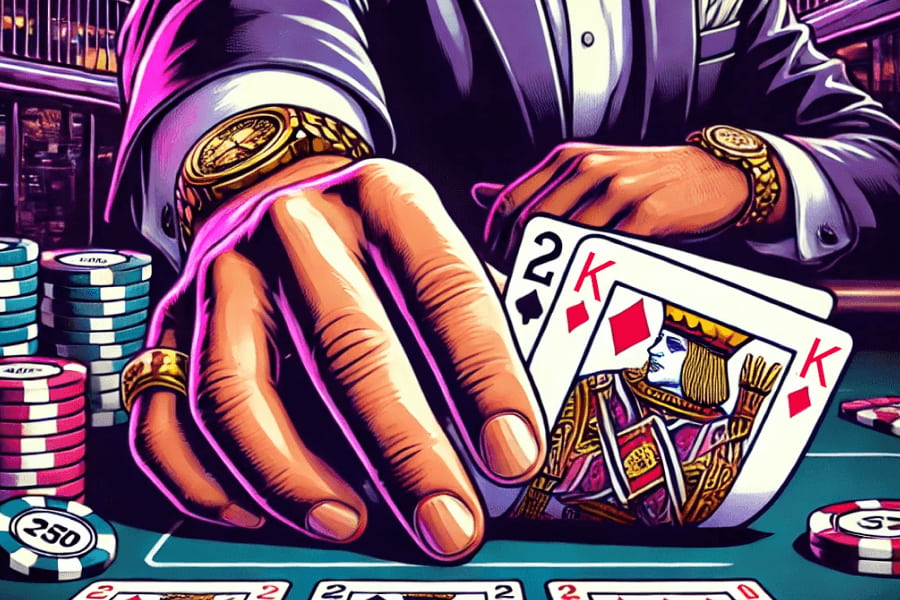Last Updated: 4 February 2026
Is Poker Skill or Luck? We Have an Answer Based on Facts
Join us as we end a long-running debate - Is poker luck or skill? We'll use scientific research, expert insights, and evidence to reach our conclusions.
StrategyMost of the public views poker as a gambling game akin to blackjack or baccarat. This misconception has eroded over the years, but not entirely. Plenty of people still see poker as just a game of luck played by hopeful gamblers.
What do you think? Is poker luck of skill?
There is a definitive answer to this question. We’ll use scientific and anecdotal evidence to prove whether poker is a skill game or luck-dependant, once and for all.
The Truth About Luck and Skill in Poker
There is no denying that luck plays a part in poker. If you’ve ever played the game, you’ve seen players hit lucky cards and beat much stronger hands. These random outcomes, unexpected cards, and improbable situations are definitely part of poker. But the real question remains: is poker based on luck or skill in the long run?
The truth is that luck in poker only lasts a short while and inevitably expires. If you play long enough, you will be dealt hundreds or thousands of both “lucky” and “unlucky” hands. The way you play your cards will matter more and more.
If you only sit down to play an hour of poker, the impact of luck is huge. You could have a huge winning session without a strong skillset and ride off into the sunset. Yet, if you play the game often, your skills will be the determining factor between winning and losing.
The Role of Luck in Poker
If you talked to a random person who barely plays poker, they would probably tell you that poker is just another game of luck. You can find it alongside real and crypto casino games, but also dramatized in moves. Everyone’s seen James Bond win big by making a royal flush, so it must be all about luck. Right?
But is poker a game of luck, or is the luck factor just a mirage?
Anyone who gets passionate about poker realizes that luck only takes you so far. In fact, professionals don’t even don’t even refer to luck. Instead, they use the term “variance,” which shows the full range of outcomes over a sample size. This gives players a look at normal expectations, plus outcomes far above or way below their prediction. It’s like having a visualizer for luck in poker.
Because of variance, the best hands in poker can’t win every time. It’s also the reason you’ll occasionally hit a set of deuces on the turn and win a big pot. And from time to time, it’s the reason your opponent hits a random two pair on the river.
Variance flows in both directions. You’ll definitely have lucky sessions where you can win big thanks to card distribution. In the long run, however, sheer poker luck (positive variance) will not be enough to make you a winner. You will need to study the game and develop some real poker skills if you want to come out on top.

Poker Games with More Luck and Variance
The impact of luck (or variance) in poker depends on a few factors. The structure of the game you play will always play a big part in how luck-oriented the game is. For example, poker games where players are forced to go all-in every hand (flip-and-goes) are 100% about luck, as players don’t make any decisions.
Games like Spin and Go, where the stacks are shallow and blinds go up fast, also rely heavily on luck. However, despite being pretty high variance, these games are not all luck. All the decisions you can make still make Spins a skill game, just one with a very high degree of variance.
Other tournament formats, such as tournaments and sit-and-goes, all come with varying degrees of variance. Typically speaking, the faster the structure of the game, the bigger the role of luck will be.
The Role of Skill in Poker
So, if the luck element in poker only plays a part in the short term, is poker a skill game?
The answer is yes: poker is a skill game, and the only way to win in the long term is by mastering the necessary skills. In fact, in November 2024, the International Mind Sports Association (IMSA) finally recognized poker as a mind sport, listing it alongside games like chess and bridge.
The term skill in poker is quite a broad one. It encompasses the understanding of mathematics, psychology, and logic, among other talents. A skillful poker player must know the odds of actions, be able to recognize patterns, and make quick decisions in real-time.
The skill level you will need to become a winner depends heavily on the games you choose. If you play against weak opposition, it may just take a few weeks or months of casual studying to dominate. If you want to play against the best players in the world, you must dedicate hundreds, if not thousands of hours to even stand a chance.

Poker Games with More Skill
We already mentioned that games like Spins or Flip-and-Goes come with heavy variance and are more luck-dependent. Contrary to those, there are other poker formats where the skill factor comes into play a lot more. These include:
- Deep Stack Cash Games: Cash games, in general, favor skill over luck quite heavily. Blinds don’t go up, stacks are deep, and you can’t get lucky to build a big stack. The deeper the stacks, the more difficult decisions you will have to make, increasing the importance of skill in the game.
- Heads-Up Poker: A heads-up poker game is one with just two players at the table. Heads-up poker is typically considered the most skillful form of the game. A very skillful heads-up poker player will usually win at a very fast pace against a less skillful player, as the impact of luck is minimized quite heavily.
- High-Stakes or Deep Stack Tournaments: At lower stakes, you will see random players get lucky and plow through a huge field, thanks to good card distribution from time to time. In high-stakes poker games, however, the best players come out on top almost always, as the average player in the field is very tough and there are no free chips floating around.
Scientific Research on Luck and Skill in Poker
Anecdotal evidence alone is probably enough to prove poker is more about skill than luck, but getting scientific confirmation is always nice. A recent study published by Mingzhe Xu of the University of California titled “Quantification of Luck and Skill in Poker Via Simulations and Expected Value Computation” sheds some light on the topic.
The study aimed to determine if luck or skill was the determining factor in poker. For the purposes of the study, poker luck included all outcomes related to card distribution, while poker skill included all outcomes related to player actions.
As you would expect, skill beat out luck by quite a margin. The study determined that 56.2% of all expected value came from skill in poker. This included things like bet sizing, positional awareness, and starting hand selection.
Now, the study was limited to a relatively small number of hands and also failed to take some elements of poker skill into consideration. The implication is that the skill element probably plays an even greater role in poker, but even with limited data, it was shown that a player’s decisions at the table make more of a difference than the cards that are dealt.
The Facts: Poker Skill Beats Luck in the Long Run
When all factors are considered, we can easily answer the question – is poker skill or luck?
It is clear that skill is the deciding factor over luck in the game of poker. Not only do the scientific simulations demonstrate that skill plays a bigger part in the game, but this was also proven by the countless poker professionals who grind poker day in and day out.
Since poker is not a casino game where one side has an inherent edge, the distribution of cards becomes equal for all players in the long run. The decisions made by the players along the way (poker skill) make all the difference in the results and eventual outcomes.
By playing better than your opponents, you can manipulate poker situations in your favor to lose less in the pots you lose and win more in those that go your way. This way, you can maximize the expected value of every situation and guarantee a long-term win against inferior opponents.
Always Rely on Poker Skill Instead of Luck
While the idea of getting lucky in poker may seem appealing at first, it is not a part of the winning mentality. Poker is all about skill, and if you want to actually win in the long run, you will need to learn how to make the right decisions time and time again.
Poker strategy can be complex, and if you are just starting out, we recommend learning some basic poker strategy first. Make sure to learn your fundamentals, such as poker hand rankings, master the odds, and learn about positional play, bet sizing, and preflop play.
As you get more comfortable with the game, you will have plenty of opportunities to learn about advanced poker strategy, GTO poker approach, and other high-level concepts. The learning curve in poker is steep, and for true students of the game, there is always something new to be learned.
Is Poker Gambling or a Sport?
After being officially recognized as a mind sport by the International Mind Sports Association (IMSA), there is no doubt left about the status of poker. Poker is a mind sport and a skill game that relies on knowledge and skillful play rather than pure luck!
Yet, poker is still usually played at casinos, and it is always played for real money. This leads many people to mistake it for gambling. While there is nothing wrong with casino games that are designed for people to have fun, the difference between poker and these games could not be greater.
Casino games are played against the house, and they give the house an inherent edge. On the other hand, poker is a competitive mind sport that puts all players on an equal footing and does not discriminate in any way. If you want to be successful at poker, you will need to learn how to outwit your opponents and use your skills to maximize your expected value across the board.
Are You Ready to Become More Skilled?
Now that you know poker is a mind sport and all about skill, all that’s left is to learn the necessary skills and put them into practice. Even learning basic poker strategy is not easy, and it will take time to master the basics. However, the poker skills you will learn at the start will be a foundation for greater things down the road.
Once you have mastered the basics, sign up with CoinPoker to get a valuable welcome bonus and play some low-stakes poker games for practice. There is no better way to master poker than by playing it, and CoinPoker offers plenty of opportunities to play poker at an affordable level and hone your poker skills.
FAQs
Poker is a game of skill with elements of luck (variance). The mathematical variance only plays a part in the short run, while poker skill determines the winners in the long run.
Yes, poker is a game of skill. The game requires a wide range of skills to be successful at, including mathematical, logical, and psychological skills.
In the short run, luck can play a big role in poker. In the long run, luck plays almost no role in a poker player’s results.
As of 2024, poker is officially recognized as a mind sport by the International Mind Sports Association (IMSA), ending the debate on whether or not poker is a mind sport.
Yes, poker is a game that relies on skill a lot more than blackjack. Even the best possible blackjack strategy still does not defeat the casino edge.
Explore More
Announcements
Read recent announcements from CoinPoker about new games, ambassadors, and changes to our platform.
1 PostGuides
The go-to resource for mastering poker with expert tips and strategies. Our guides will elevate your poker skill level.
60 PostsNews
Find the latest poker news and latest CoinPoker Newsletters. Get updates about games, promotions, and crypto news.
96 PostsPromotions
Find the latest coinpoker promotions here. Explore the crypto poker world with the best poker promotions available.
1 Post
















